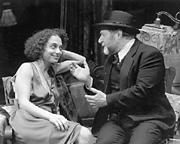WHEN IS AN NEW PLAY not a new play? When it’s an adaptation of an old one, of course. While ACT is trumpeting its production of God of Vengeance as a “world premiere,” it’s actually Donald Margulies’ reworking of a play by Sholom Asch that premiered in Germany in 1908. That first production was in Yiddish, as was its American premiere several years later. While it played across Europe and in this country to the occasional finger-wagging or critical attack, it wasn’t until a production in English on Broadway in 1923 that the powers that be woke up and tossed the entire cast into jail.
God of Vengeance
A Contemporary Theater through May 7
It’s not hard to see why. In that year, this play about Yankel Tshaptshovistch, a man who is keeping a respectable middle-class household upstairs while running a brothel below, was bound to upset a few moral watchdogs. Not to mention that despite Yankel’s efforts to preserve the purity of his teenage daughter Rivkele, said daughter has fallen in love with one of her father’s prostitutes. Although 1923’s season included plays by Eugene O’Neill and Elmer Rice’s expressionist drama The Adding Machine, the combination of Jewish culture, religion, prostitution, and homosexuality pushed the envelope to its tearing point.
But welcome to 2000. Even theatrical scholars interested in Asch’s original play admit that it’s a sentimental, old-fashioned melodrama. And modern audiences aren’t too shocked by moral hypocrisy, prostitution, or two girls falling in love.
Which is probably why, despite a strong cast, Gordon Edelstein’s fluent direction, and all the resources of ACT’s budget and scene shop, this adaptation is such a disappointment. Margulies makes some cosmetic changes to the script, moving the action from a Polish ghetto in 1908 to New York’s East Side in 1923, setting the action simultaneously on two levels of the house, and fiddling with various other things. But it’s hard to see why this rusty piece of theater history was thought worthy of revival.
IT’S NOT THAT the play’s themes are hard to explicate. One glance at Hugh Landwehr’s elegant, two-tiered set, with its lacy blue upper levels and blood-red beds below, makes the sacred/profane theme obvious. Just in case you miss it, however, as soon as Yankel (Matthew Boston, whose considerable dramatic power is mostly limited to kvetching and angry outbursts) arrives home, we see him settle up with the downstairs whores before ascending to tell his wife he’s ready to return to a religious life. This plan hinges on his purchase of a handwritten Torah from the scribe Reb Aaron (Sol Frieder, humorously staid), which will be part of the dowry offered up to the prospective bridegroom of his beloved daughter Rivkele (Rachel Miner, beautiful but rather showily repressed), who he still treats like a child. She, in turn, wants to offer him a vestment that she’s embroidered with the help of Manke (Naama Potok), the object of her desire.
Oh, the irony. Oh, the ironies piled on ironies, with a plodding fidelity to Asch’s original that’s downright puzzling. Perhaps this goy is too far out of the loop, but do mainstream Jews find this material particularly shocking or revelatory?
From references to the original production, Margulies seems to have even softened its impact; it had Yankel pulling his wife around by the hair and kicking her. While graphic displays of domestic violence may not be called for, the current production seems positively milksoppish by comparison, with Sara being pushed onto a bed and yelled at. Is the playwright worried we might find his hypocritical pimp too unsympathetic?
Edelstein keeps the action moving simultaneously through three rooms and the sidewalk outside, but the entire setup, from set to setting, seems strangely more suited to a farce than a serious drama. In fact, the play’s irredeemably old-fashioned subject matter suggests that if he’d been significantly more daring, Margulies could have turned this into a hilarious bedroom farce. (Moments such as Yankel’s midnight conversation with his own Torah, which begins “Hello God,” teeter dangerously close to this in any case.) Seeing as he seems to have been uninterested in rethinking his material in any more profound fashion, this might be the easiest fix for a distinctly unmoving evening.








